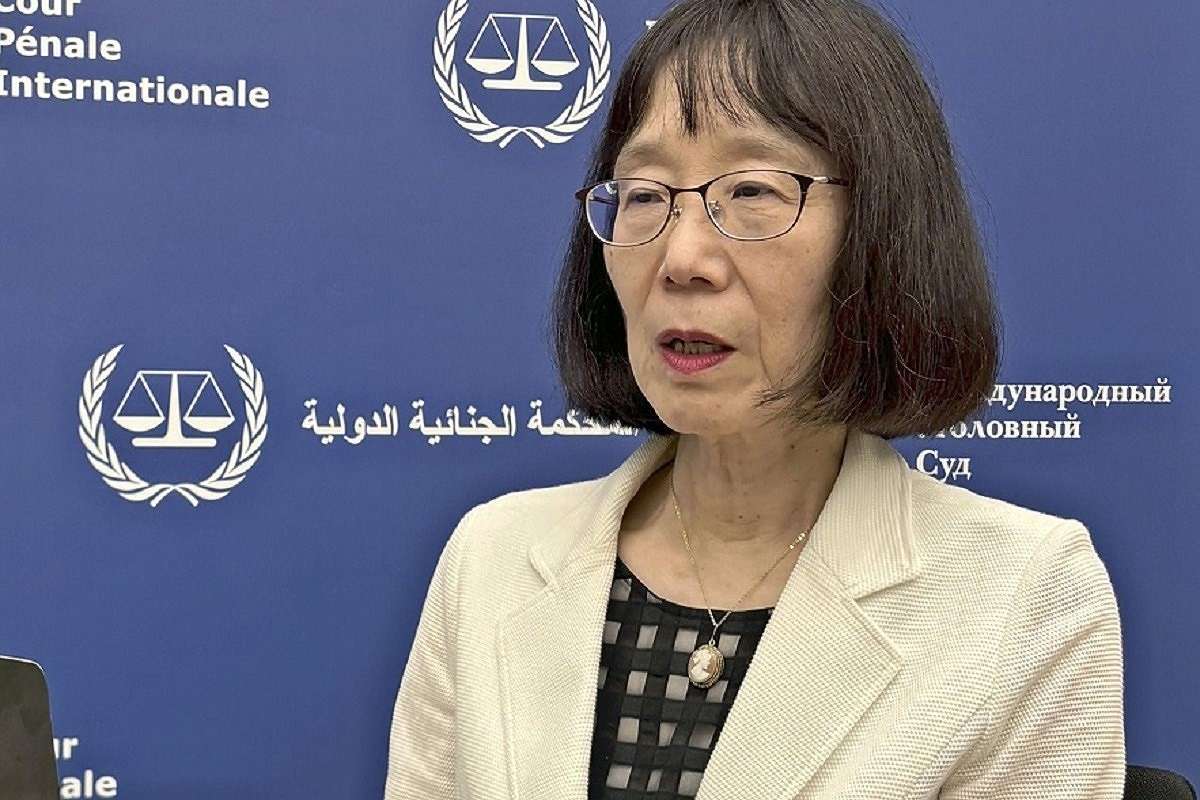
ICC President Tomoko Akane accepts The Yomiuri Shimbun’s interview in the ICC headquarters in The Hague on Wednesday.
20:00 JST, August 17, 2024
THE HAGUE — Tomoko Akane, president of the International Criminal Court (ICC), which tries individuals for war crimes, voiced a sense of crisis about sanctions which the United States is considering imposing on the organization, during an interview with The Yomiuri Shimbun on Wednesday.
The U.S. Congress in June passed a bill to impose sanctions on the ICC in connection with ICC prosecutors’ investigations into alleged war crimes by Israeli Prime Minister Benjamin Netanyahu and other officials.
Akane said, “If the sanctions are imposed, the ICC’s operations will be completely halted.”
The ICC’s Office of the Prosecutor demanded in May the issuance of arrest warrants against Netanyahu and some of his aides on the grounds that the country’s intentional enclosure of the Gaza Strip, which resulted in humanitarian crises, constituted a war crime and other chargeable acts.
The ICC’s pretrial division is closely examining whether the arrest warrants should be issued.
The U.S. House of Representatives, which supports Israel, in June passed a bill to impose sanctions on ICC officials with a majority vote. The bill demands the U.S. administration freeze their assets in the United States and limit the issuance of visas for them.
If the bill is passed by the Senate and the president signs it, the sanction bill will go into effect.
Akane said that if the sanctions are imposed, “Most financial institutions and companies inside and outside of the United States will fear they may be subjected to the sanctions and cut off relations with the ICC.”
She added, “We would be unable to pay facility-keeping costs and workers’ salaries, and we would have to release all suspects and defendants in detention facilities.”
Because the ICC is conducting investigations into Russia’s war crimes in its ongoing aggression on Ukraine, U.S. President Joe Biden is opposing the sanction bill, and the U.S. Senate is keeping a wait-and-see attitude.
In 2020, when Donald Trump was the U.S. president, the now Republican presidential candidate imposed sanctions on two ICC officials, including a prosecutor, over the ICC’s stance of investigating U.S. soldiers stationed in Afghanistan.
If the next U.S. administration is GOP-led, the possibility of the sanctions being imposed will be higher.
Regarding Trump, Akane said, “We do not engage in politics. Whoever the next U.S. president will be, the ICC’s stance of fulfilling its role as a criminal court will not change.”
About its investigation into Israel’s alleged war crimes, she emphatically said, “We do not bend to political pressure.”
At the same time, Akane revealed that the ICC “has asked for cooperation from its member countries” so that they will call on the United States to avoid imposing the sanctions.
She urged Japan, which is the largest contributor of funds to the ICC, to take such actions as “exercising diplomatic power.”
“If the ICC’s functions are paralyzed, the world’s rule of law will be shaken and it will be a problem also for Japan,” she added.
Russian media recently reported that the Mexican government had invited Russian President Vladimir Putin to the inauguration ceremony for the country’s next president in October, even though the ICC has issued an arrest warrant against him.
It is feared that Mexico, which is a member nation of the ICC, will neglect its obligation to detain a person wanted by the ICC.
Akane said, “We have notified member countries that cooperation in serving our arrest warrants is their obligation.”
Top Articles in World
-

Israeli Ambassador to Japan Speaks about Japan’s Role in the Reconstruction of Gaza
-

Videos Plagiarized, Reposted with False Subtitles Claiming ‘Ryukyu Belongs to China’; Anti-China False Information Also Posted in Japan
-

North Korea Possibly Launches Ballistic Missile
-

Chinese Embassy in Japan Reiterates Call for Chinese People to Refrain from Traveling to Japan; Call Comes in Wake of ¥400 Mil. Robbery
-

Russia: Visa Required for Visiting Graves in Northern Territories, Lifting of Sanctions Also Necessary
JN ACCESS RANKING
-

Japan PM Takaichi’s Cabinet Resigns en Masse
-

Japan Institute to Use Domestic Commercial Optical Lattice Clock to Set Japan Standard Time
-

Israeli Ambassador to Japan Speaks about Japan’s Role in the Reconstruction of Gaza
-

Man Infected with Measles Reportedly Dined at Restaurant in Tokyo Station
-

Videos Plagiarized, Reposted with False Subtitles Claiming ‘Ryukyu Belongs to China’; Anti-China False Information Also Posted in Japan
























